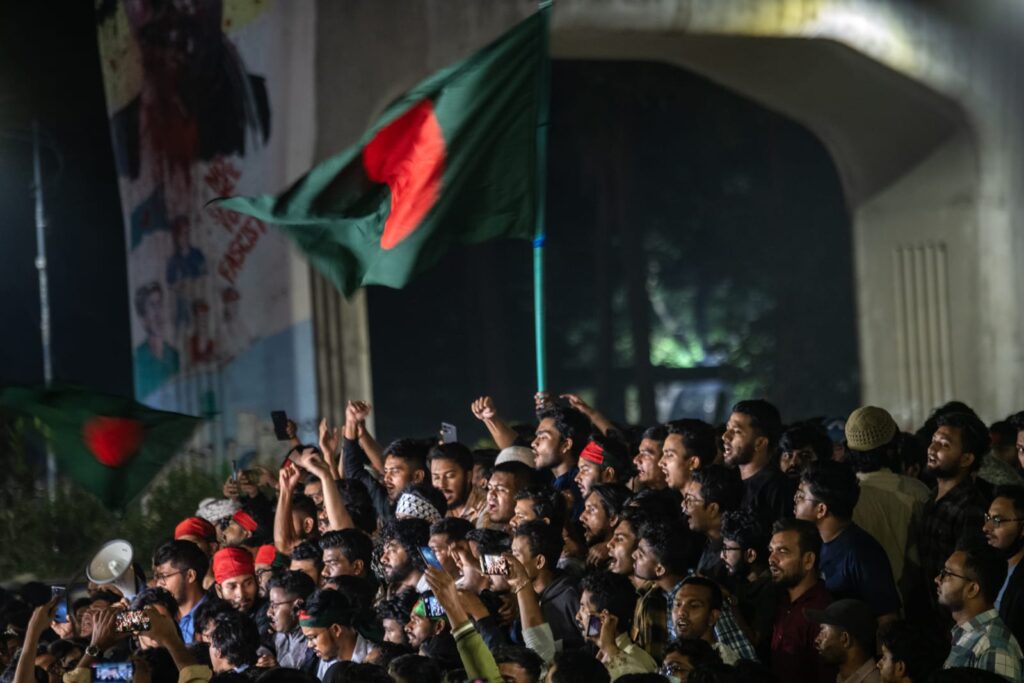An attack on the Bangladesh diplomatic compound in the Indian border town of Agartala this week has brought new tensions to an already delicate phase in Bangladesh-India relations. What began as a local protest over the alleged persecution of Hindus in Bangladesh escalated into a violent intrusion. Protesters breached the compound, tore down the Bangladeshi flag, and set it ablaze and vandalised the premises.
The incident was the second in a series of anti-Bangladeshi demonstrations, following similar actions in Kolkata the week before, where the Bangladeshi flag was also burned by members of far-right religious group Bangiya Hindu Jagran Manch. These acts have triggered fierce criticism from Bangladeshi officials and civil society alike.
India has long been seen as a regional power with vested interests in Bangladesh. Leading up to the overthrow of Bangladesh’s long-serving prime minister Sheikh Hasina in August this year, resentment towards India had grown in Bangladesh, being seen as propping up her rule. India maintained that the violent suppression of protesters was an “internal matter” for Bangladesh. Many in Bangladesh viewed this as an implicit endorsement of Hasina’s autocratic measures. Following her ouster, Hasina has sought refuge in India.
Such statements are reflective of a new assertiveness in Bangladesh’s foreign policy, breaking away from the dependency narratives of the past.
And India’s relationship with Bangladesh’s interim government led by Muhammad Yunus in recent months has not been easy. Indian authorities and far-right media outlets in the country have since amplified concerns about minority rights in Bangladesh, a pivot many interpret as an attempt to justify greater involvement in the country’s politics. Claims such as that from India’s West Bengal Chief Minister Mamata Banerjee that a UN peacekeeping mission should be deployed in Bangladesh have inflamed sentiment. India’s perceived selective concern has been criticised in Bangladesh as hypocritical, given India’s own record of minority treatment and ongoing ethnic tensions. Yet at the same time, images circulating online showing individuals in Bangladesh using the Indian flag as a doormat have further stoked tensions. Public anger is building on both sides.
India’s Ministry of External Affairs described the attack in Agartala as “deeply regrettable”. But many in Bangladesh see this as insufficient. Public condemnation of India has been loud. In an official statement, the Bangladesh Ministry of Foreign Affairs condemned the attack and described it as heinous. The statement also said that the attack in Agartala stands in violation of the inviolability of diplomatic missions, as required under the Vienna Convention on Diplomatic Relations.
Such statements are reflective of a new assertiveness in Bangladesh’s foreign policy, breaking away from the dependency narratives of the past.
The underlying sentiment is one of frustration: a neighbour that once played a pivotal role in Bangladesh’s liberation now appears more intent on interference than cooperation. That when the July Movement was met with state violence, India turned a blind eye, ostensibly to protect its alignment with the Hasina regime. Sensationalist coverage in Indian media exacerbates tensions and damages the possibility of constructive dialogue between the two nations. Such portrayals not only misrepresent the complexities of Bangladesh’s internal dynamics but also risk alienating a generation of Bangladeshis who are increasingly wary of India’s intentions.
At the heart of these tensions lies a broader debate about sovereignty, influence, and the evolving dynamics of South Asian politics. India’s actions, whether through its media, state apparatus, or diplomatic engagements, reflect an attempt to maintain its influence in Bangladesh during a transitional period. However, such efforts risk backfiring if they are perceived as heavy-handed or hypocritical. For Bangladesh, the challenge lies in navigating this delicate phase without alienating a powerful neighbour while asserting its independence and priorities on its terms.
The Agartala incident, and the broader controversies surrounding it, are emblematic of the challenges facing Bangladesh-India relations. For Bangladesh, this is an opportunity to redefine its identity on the international stage, moving beyond the shadow of dependency that has long characterised its ties with its “big neighbour”. For India, the stakes are equally high: failing to address these tensions constructively could lead to a significant loss of influence in a region where its leadership is already being contested by other powers such as China.

